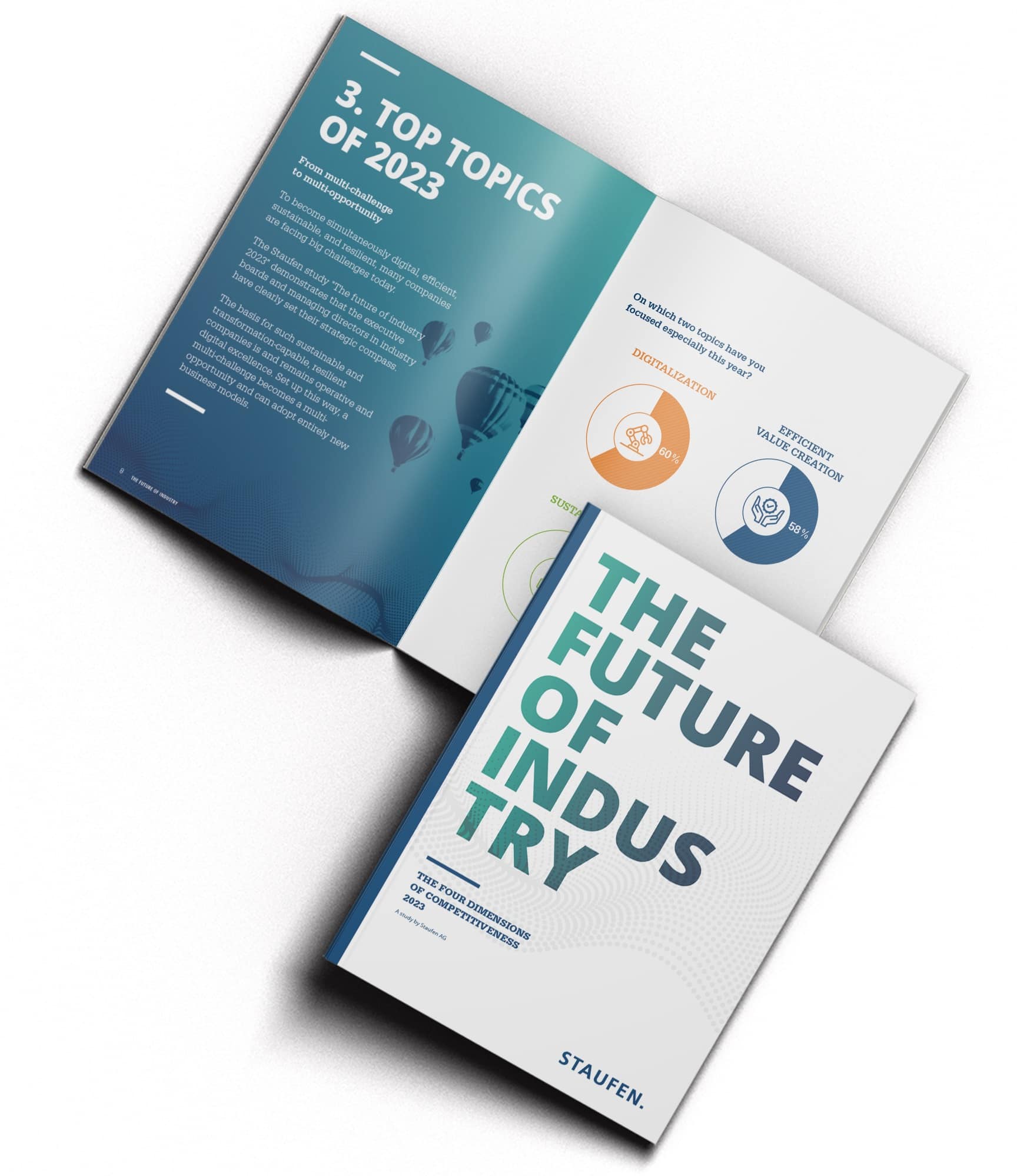
A dual-class digital society has established itself in industry: according to the current study “Future Industry 2023,” 49% of the companies surveyed are proceeding actively with digitalization. The rest are currently still stuck in individual projects or have yet to find true access to this topic. For the study, the consulting company Staufen surveyed more than 400 industrial companies from German-speaking Europe.
Smart factories with intelligent machines, efficient processes, autonomous transport vehicles, and service robots have been dominating the discussion around Industry 4.0 for years. Six out of ten companies have therefore put their own digitalization at the top of the agenda again this year. “When it comes to the actual implementation, there is a lot left to do in order to exploit the full potential of digitalization,” says Dr. Michael Feldmeth, who manages the Digital & Industry 4.0 practice unit at Staufen. “Many companies are still feeling their way along this topic with different, not always coordinated individual projects.”
Greatest digitalization potential in production and in the supply chain network
Nevertheless, 59% of companies are pushing ahead with digitalization projects despite the tense economic situation. Almost half (44%) have even started new projects. Most companies (86%) have promised themselves increased efficiency. Three-quarters (75%) also expect greater transparency in processes and in more than half of companies (57%), digitalization is also supposed to help reduce costs. In addition to production (62%), industry sees the greatest potential in optimizing the supply chain network (60%). “Frequently, it’s a question of the approach. All companies know that they must digitalize. However, many do not yet know how they can get the best from digitalization and therefore they begin with projects to increase efficiency,” says digitalization expert Feldmeth.
Exploiting new markets with alternative business models
For the Staufen consultants, this can only be the first step. “The greatest benefit of digitalization is in developing new business models. The pioneers of Industry 4.0 have already realized this and implemented the technology strategically.” However, only half of companies are advancing digitalization strategically. Nearly three-quarters of companies (73%) offer services with Industry 4.0 functionalities, for example in the area of predictive maintenance, but only 3% have already developed new business models on a digital basis. “In particular, individual digitalization projects help small and medium-sized companies come through the current crisis. But anyone who wants to be fit for the future in the long term needs alternative business models in order to be able to exploit new markets and sales potential,” says Michael Feldmeth.
About the “Future Industry 2023” study
For the study, the consulting company Staufen AG surveyed a total of 401 companies in Germany, Austria, and Switzerland on the topics digitalization, efficient value creation, sustainability, and resilient networks. The survey was conducted in the spring of 2023.
Save the Date
BestPractice Day 2023: Top companies present the value creation networks and business models of the future
BMW, GEA, Siemens, and Trumpf are just a few of the numerous companies that will share their knowledge with participants at the BestPractice Day 2023 on June 27th in Darmstadt. Workshops on June 28th will also provide live insights into the topics of digitalization, lean, and green transformation. The central questions on both days: What makes companies capable of sustainable change and thus fit for the future? How do top companies deal with current challenges? What effects did they have and what can we learn from them?

This might also interest you

数字化 & 工业4.0
为了通过工业4.0的智能生产流程实现更高的生产力和效率,为了更快更有针对性地满足个人客户的愿望,或者为了开发全新的工业产品和商业模式,它们都是不可或缺的先决条件。尤其是中小型企业特别需要这方面的支持和咨询意见。
Read more

